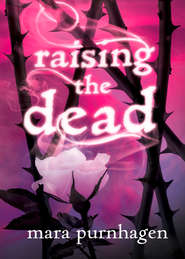скачать книгу бесплатно
“They put them on garbage trucks?” I couldn’t disguise the disgust in my voice. It seemed so disrespectful.
“Yes,” Mom confirmed. “The trucks are big enough to hold the coffins and don’t attract attention.”
“Still,” I said. “It seems so gross.”
“It’s practical,” Dad said. “These people have been dead for so long that they have no family members who would remember them. It’s the best way to transport them without attracting unnecessary attention.” He nodded, satisfied. “Very smart.”
It may have been practical and smart, but I couldn’t help think of the other Charlotte, the girl who had died over a hundred years earlier and who had spoken to me in Charleston. I wouldn’t want her thrown into the back of a garbage truck. I wouldn’t want anyone carted around that way. It was dehumanizing.
“We’ll meet with the caretaker tomorrow morning,” Mom said. “It’s such an old, tiny little cemetery that it’s basically been forgotten. The man I spoke with mows the grass twice a year, and that’s about it. This whole situation has him rattled.”
“But he’s willing to accept our help?” Dad asked.
“Yes.” Mom played with her fork. I was pleased to see that she had eaten all of the dinner I had single-handedly prepared, even if it was simply canned food heated in the oven. “He understands that the bodies need to be interred as quickly as possible. He also understands that we have an historical interest in the work.”
Historical interest. It was a fancy way of saying that my parents like to look at old dead bodies. One of Mom’s stock lectures focused on historical burial rites and practices. This was like winning the corpse research lottery.
She explained that she wanted to visit the cemetery first. A geological survey team would be there to make sure the ground was safe and that the caskets could be returned to the earth.
“How are you going to match the bodies with their gravestones?” I asked.
“That’s where my expertise comes in.” Mom finished her dinner and moved her plate to the side. “We’ll start by examining artifacts left with the bodies. How they’re dressed will help narrow down a time frame, as well. But we may not be able to correctly identify each one.”
“We’re talking about centuries-old wood,” Dad said. “How many even survived the flood intact?”
“Not many. But there’s about a dozen complete caskets. Cracked, but whole.”
“So some of the caskets aren’t whole?” I looked down at my half-eaten spaghetti. I wasn’t so hungry anymore.
“No. Most of them were damaged too heavily. Chances are the remains inside weren’t substantial, though.”
I hoped not. I could imagine someone emerging from their house after days stuck inside, only to discover a withered arm resting on the sopping wet lawn. My parents’ task was a strange one, but it held importance. It helped restore a kind of peace.
“How can I help?”
Mom and Dad looked at me. “We weren’t planning on having you help,” Dad said.
“We didn’t think this would be something you would be interested in,” Mom rushed to add.
“I’m not.” I had no intention of lifting coffin lids and peeking in. But I was used to being a part of the family team. It never occurred to me that I wouldn’t be involved in some small way. “I was thinking of clerical stuff or research or whatever. But if you don’t need me, that’s fine.”
“Clerical work,” Mom repeated. “I’m sure we could come up with something.”
“You could work from home.” Dad smiled. “We’ll call you if we need anything.”
It was a brush-off, and despite the fact that this was not a project I was eager to get too involved with, my parents’ quick dismissal of me stung. After dinner I went to my room and called Annalise.
Вы ознакомились с фрагментом книги.
Для бесплатного чтения открыта только часть текста.
Приобретайте полный текст книги у нашего партнера:
